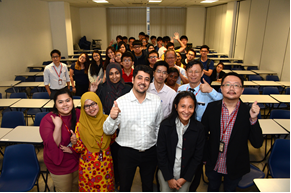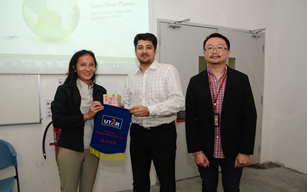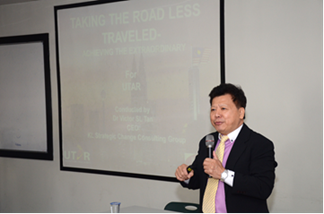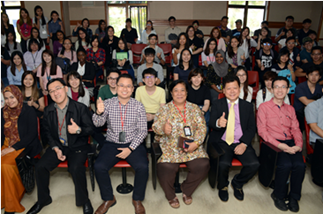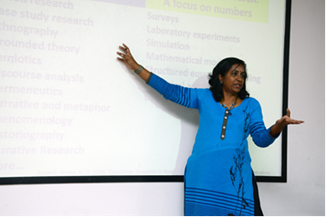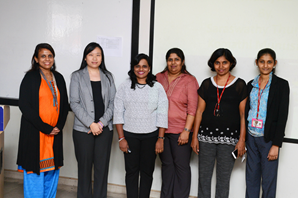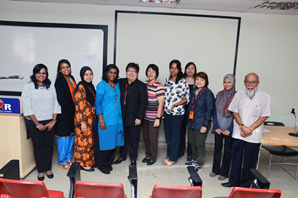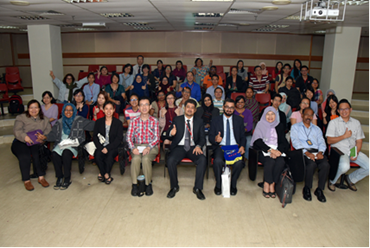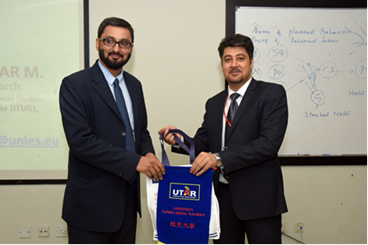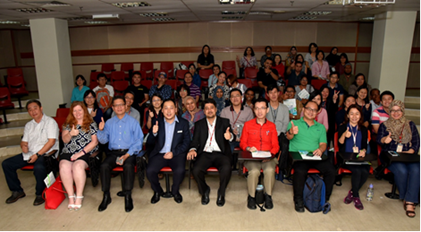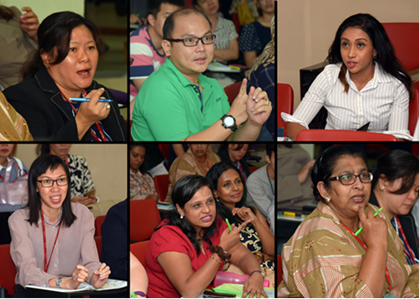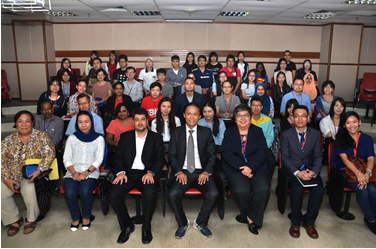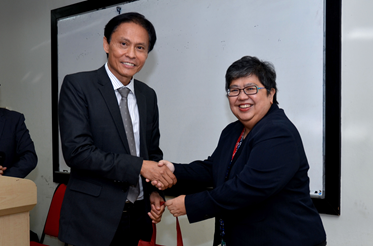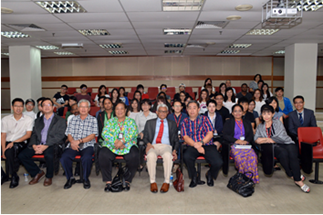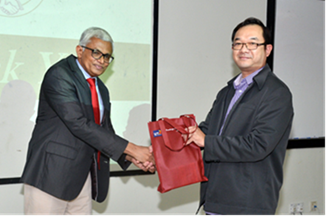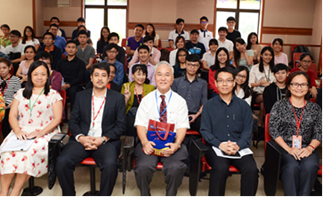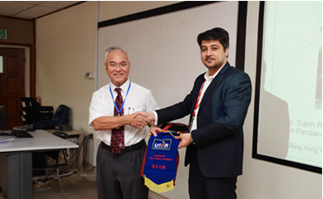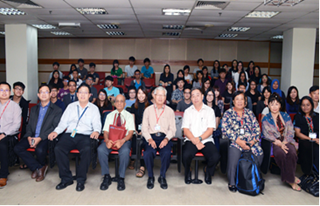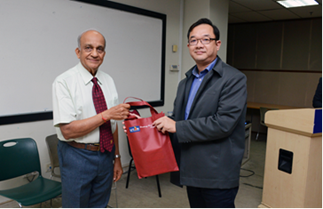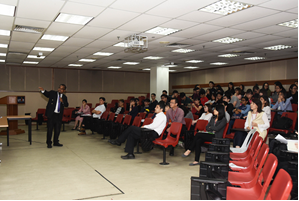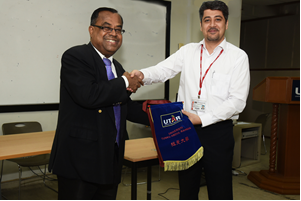Activities Report
| Talk Series Sustainable Lifestyle: Challenges and Practices in an Urban Environment |
|---|
Date: 21st February 2017
In her talk, she spoke on the challenges of living a sustainable lifestyle in urban environments in Malaysia and the immediate practices and measures that should be taken to reduce food wastage and non-biodegradable waste. She shared on the challenges and the feasibility of zero-waste movements. “Sustainability is about making the choice to lead a responsible life starting from now for a better future, environment and society. The little changes in your lifestyle and habits can make a huge impact on the environment. To be an agent of change, first you have to change yourself.” remarked Phang. |
| Talk Series Taking the Road Less Traveled - Achieving The Extraordinary |
|---|
Date: 21st March 2017
Dr. Victor S.L. Tan is the principal consultant and Chief Executive Officer of KLSCC group. He has more than 25 years of experience in consulting, banking, strategic planning and training. The talk aimed to convey the management and practical skills for achieving personal goals and dreams to academics and students. Besides that, the talk promoted the importance of change management in pursuing dreams and sustaining personal goals. In Dr Tan’s talk, he mentioned, “Your belief determines your reality. Don’t let fear stop you. Knowledge is potential power that needs to be incorporated with courage on the road that is less travelled.” He shared a few lessons throughout the talk. Among them was to rise against the odds and find the courage to fight on. Besides that, knowing how to pull internal resources and do the extraordinary will change the mindset and transform you and others around you. |
| Seminar Disaster Risk Reduction and Management |
|---|
Date: 27th March 2017
The aim of this study was to examine if the theoretical effects relieved the problems faced by Majlis Keselamatan Negara (MKN) and contribute to the body of knowledge. The findings revealed that the existing problem is widespread across all states in Malaysia. There is hardly any systematic information system solution to circumvent the challenges. iCemas KMS was perceived as one stop center for MKN to communicate, coordinate, and collaborate with community and supporting agencies. |
| Talk Series Identifying Research Gap and Finalizing Research Problem |
|---|
Date: 26th April 2017 Prof Dileep shared on the different websites to locate research gaps such as Social Mention, Springer, Google Ads, Broadreader which provides popularity, various bars and charts to demonstrate the trends in different time span and the most recent articles that have been downloaded. |
| Workshop A Guide to Getting Published Workshop |
|---|
Date: 27th April 2017
Centre for Sustainable Development and Corporate Social Responsibility in Business (CSDCSR) organised a professional public talk entitled, “A Guide to Getting Published Workshop” at Sungai Long Campus. This talk was to provide a comprehensive guide in optimising the use of the academic writing and the preparation skills whilst focusing on best practice for submission and post-publication promotion. The invited speaker was Elvin Cheah, a Business Manager at Emerald Group Publishing Limited, who has conducted numerous workshops to support many authors, editors, reviewers, aspiring authors, researchers, faculty members and doctoral candidates in publishing their research for international peer-reviewed scholarly journals. |
| Talk Series Globalisation and DeGlobalisation |
|---|
Date: 12th July 2017
The talk was delivered by Gary Lit Ying Loong, the director of GL Training and Consultancy based in Singapore and his role is that of a business investment and consulting. |
| Talk Series Factors Determining Natural Rubber Prices |
|---|
Date: 21st July 2017
The two-hour talk was presented by senior economist Jom Jacob from the Association of Natural Rubber Producing Countries (ANRPC), an inter-governmental organisation of natural rubber producing countries. Jacob began his talk by mainly emphasising the importance of acknowledging the price of natural rubber. “The natural rubber pricing is very important for Malaysia,” he continued, “A sizeable number of people depend on the movement of rubber price. Even though people are not directly linked to the rubber price, many industries and business companies always complain their business is not doing well because of poor performance of the rubber price.” With the main objective to identify the major factors that often influence a transformation in the natural rubber industry worldwide, Jacob shared his insights on several factors such as supply and demand, crude oil trends, currency movements and flow of speculative funds. He particularly emphasised on the flow of speculative funds and explained the link between natural rubber price and crude oil price. |
| Talk and Demo Governing Common Properties of Low-Cost Flats in Selangor: Issues and Challenges |
|---|
Date: 31st July 2017
The talk featured the speaker, Dr Wang Hong Kok who is a Fellow of The Institution of Engineers, Malaysia (IEM), and currently serves as its Honorary Treasurer, Session 2017/2018. Dr Wang graduated in civil engineering from the University of Singapore in 1976. In 2016, he passed the professional assessment interview of the Royal Institution of Chartered Surveyors, UK (RICS), and became a Chartered Surveyor. |
| Workshop Role of Financial Sector Development in the FDI-Growth Nexus in Pacific Islands: A Case Study of Fiji |
|---|
Date: 7th August 2017
The invited to deliver the talk was Professor Dr Tiru K. Jayaraman, professor in the School of Economics, Banking and Finance, Fiji National University (FNU), Nasinu Campus, Suva, Fiji Islands. Prof Tiru remarked, “Foreign Direct Investment (FDI) helps reducing risks faced by imitating domestic firms, while Financial Sector Development (FSD) promotes FDI absorptive capacity of the host country. Research shows that positive growth exists when FSD (as percentage of GDP) exceeds a threshold. FDI supplements domestic savings and management capacities through the transfer of skills. FSD reduces risks involved in investment decisions by domestic investors who innovate along the lines of foreign entrepreneurs through imitation.” |
| Talk Series Fourth Industrial Revolution: Socio-Economic Issue in Oil Palm Industry |
|---|
Date: 2nd November 2017 The speaker invited to deliver the talk was the Director of Economics and Industry Development Division of Malaysian Palm Oil Board, Mr. Balu Nambiappan. At the talk, Balu provided an overview of palm oil industry to the audience and advised them to access the words properly in a particular domain of knowledge before knowing the things better. He said, “Many people are actually having problems with distinguishing between oil palm and palm oil. Oil palm is the general term of palm tree, whereas palm oil is the product produced from oil palm fruit.” During the talk, he also described several issues and consequences that have impacted the palm oil industry. He explained that Malaysia had been one of the leaders in palm oil production but countries especially the European Union (EU) wants Malaysia to adopt their standard. He indicated that ‘no palm oil’ or ‘palm oil-free’ labelling is discriminatory and unfair, and the generic terms like ‘vegetable oils’ should not be used to denigrate palm oil. “Most of the consumers have no idea that palm oil is actually in the food they are consuming. This is because the word ‘palm oil’ is rarely used to display on the product labels. It is discrimination against palm oil,” said Balu. He mentioned that the allegations made by western NGOs were baseless, where they claimed that palm oil cultivation was damaging the environment, leading to deforestation and loss of biodiversity. Moreover, he highlighted the importance of palm oil and also gave a comprehensive SWOT analysis and outlook of the Malaysian oil palm industry to the participants. “The consumption of palm oil is expected to increase. The industry will continue to be very sun-rising in line with the growing demand of palm oil,” said Balu. |

